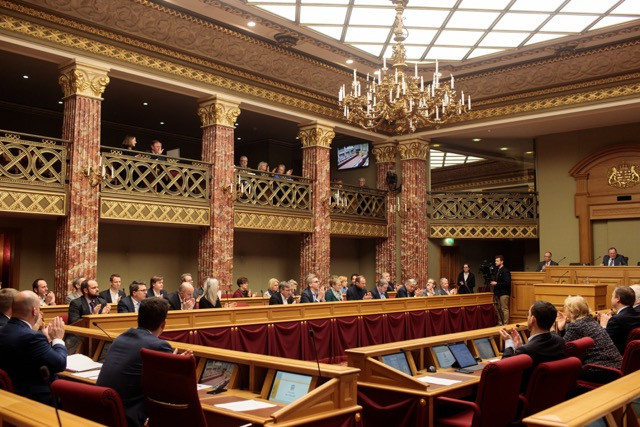Neither a marathon or a sprint, the race to revise Luxembourg’s constitution, which dates back to 1868, will restart in the autumn. The revision has been sitting in the in-desk of the parliamentary committee on institutions and constitutional review for more than 10 years. It should have initially been subject to a referendum in 2015, and then in 2018.
The magnitude of the task, the fiasco of the 2015 referendum results (on the right to vote at 16 years old, the limitation of mandates for government ministers and the political participation of non-Luxembourgers), and 2018’s narrow election victory have all contributed to dashing the hopes of the DP-LSAP-Déi Gréng government.
Worse, the consensus forged between the majority parties and the CSV, which had been conditional on the holding a consultation with the populace, cracked in the summer of 2019. Any reform of the constitution requires two-thirds majority approval in parliament.
What Alex Bodry (LSAP) called “broken confidence” and the late Eugène Berger (DP) labelled a “stab in the back”, the CSV’s U-turn caused turmoil in the Chamber of Deputies--and that’s without considering the minority parties, the ADR, the Pirate Party and Déi Lénk, who were not amused by the spectacle that the four “large” parties put on.
In the end, the latter agreed on a revision in small steps rather than a wholesale reform of the constitution.
Working throughout covid
Several months later, the first bill to revise part of the constitution was tabled in the Chamber of Deputies. “We have not stopped working throughout the covid-19 crisis,” says Mars Di Bartolomeo, LSAP MP and former speaker of the chamber, who is currently the chairman of the committee on institutions and constitutional review. “I have finalised the chapters on the organisation of the state, the territory, the grand duke, the government and some other miscellaneous provisions. I will present these to the commission on July 20.”
DP member Simone Beissel is working on a chapter focused on freedoms and Déi Gréng’s Charles Margue is tackling those provisions that affect the Chamber of Deputies and Council of State. “We have come a long way,” says Di Bartolomeo, praising “a very good atmosphere”.
However, the immediate future does not seem so rosy for the revision of the constitution. The first chapter to go before the chamber is a meaty one: the organisation of the judiciary, and in particular the creation of a (national) Council of Justice charged with managing personnel and disciplinary issues.
This chapter was especially expected to correct the flaws of the current constitution, in particular in terms of the independence of the prosecutor’s office vis-à-vis the ministry of justice.
Vitriolic communiqué
However, the prevailing consensus collapsed at the beginning of the year, much to the exasperation of the main interested parties. This was evidenced by a vitriolic communiqué issued by the magistrates’ professional association, the Groupement des magistrats luxembourgeois, and a 64-page opinion delivered by the prosecutors at the district courts of Luxembourg and Diekirch at the beginning of July.
Their grievances suggest that the prosecutors believe the reform of the constitution is “inspired by a distrust of the judicial authorities and a desire to avoid promoting their independence or even to recognise their status as judicial authorities. Whatever a priori may have inspired them, they are in part at odds with the demands of the rule of law and constitute a missed opportunity to endow Luxembourg with institutions that are at the heart of the 21st century.”
But Di Bartolomeo refutes that and says that “nobody is questioning the impartiality and independence of the judiciary”. The return of parliament will certainly be tense on this issue. “We will see if there is a two-thirds majority in the house on this chapter,” says one source. “That will be the moment of truth, because the other chapters are generally less explosive.”
This article was originally published in French by Paperjam. It has been edited and translated by Delano.
